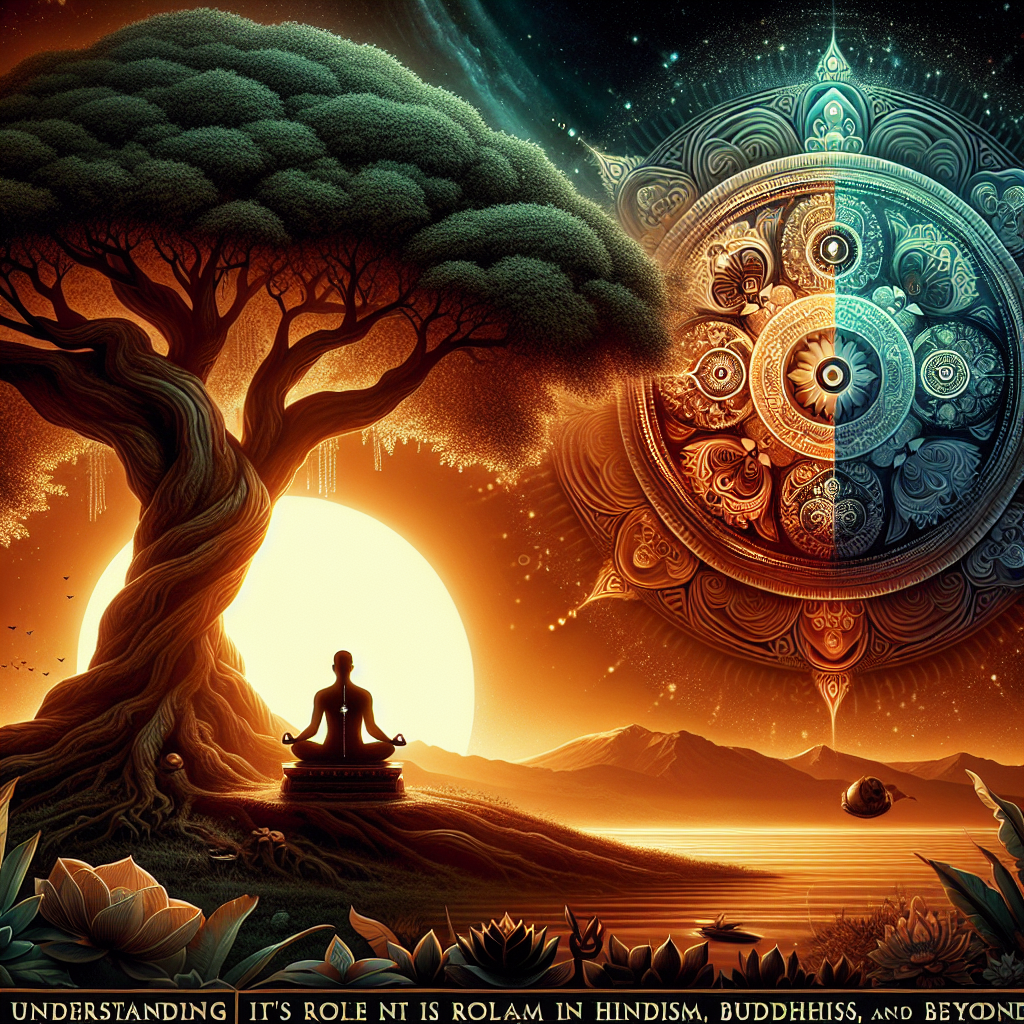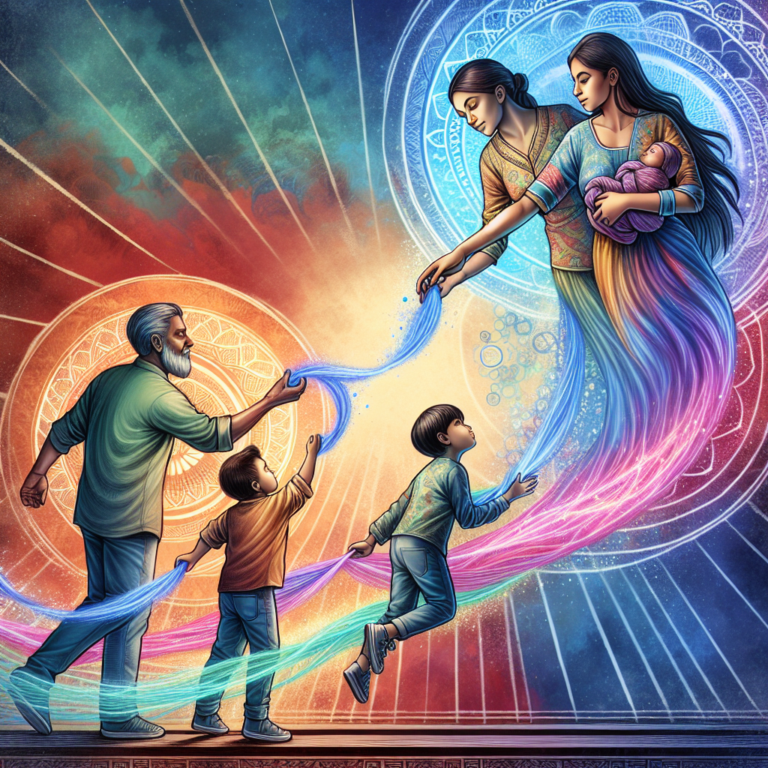Karma is a term that resonates deeply within the cultural and spiritual narratives of many Eastern religions, particularly Hinduism and Buddhism. Its basic premise — the idea that our actions have consequences — offers a profound insight into human behavior and morality. However, the interpretation and implications of karma vary significantly across different philosophies and practices. This article seeks to unveil the complexities of this concept, examining its significance in Hinduism and Buddhism and exploring how it has transcended into contemporary understanding beyond these traditions.
Karma in Hinduism
In Hinduism, karma is intricately woven into the fabric of dharma (moral duty) and samsara (the cycle of birth, death, and rebirth). The word ‘karma’ comes from the Sanskrit root ‘kri’, meaning ‘to act’ or ‘to do’. In this context, karma refers not only to actions but also to the intent behind those actions. It is believed that every action, whether good or bad, creates a ripple effect that influences an individual’s future experiences.
The concept of karma is inherently dualistic. Good deeds (punya) contribute to positive karma, leading to favorable circumstances in this life or the next. Conversely, bad deeds (papa) result in negative karma, which can manifest as suffering or misfortune. This cyclical process underscores the belief in reincarnation; one’s current life situation is a product of actions taken in previous lives. The ultimate goal is moksha, or liberation from the cycle of samsara, achieved through righteous living and self-realization.
The Bhagavad Gita, a central text in Hindu philosophy, offers a profound exploration of karma. It emphasizes the importance of performing one’s duty without attachment to the results, advocating for a selfless approach to action. This detachment is seen as a pathway to spiritual liberation, signifying that intentions can be just as critical as the deeds themselves.
Karma in Buddhism
Buddhism, while sharing roots with Hindu thought, offers a distinct interpretation of karma, focusing more on intention and the mind rather than the notion of a self that carries karma from one life to the next. In Buddhism, the term "karma" (kamma in Pali) refers explicitly to intentional actions — the mental, verbal, and physical deeds that shape an individual’s experiences in this life and future rebirths.
In the Buddhist framework, karma is central to the concept of dependent origination, which explains how all phenomena arise in connection to one another. This interconnectedness means that every action generates consequences, propelling the cycle of birth and rebirth (samsara). However, Buddhism teaches that the cycle can be broken through the realization of enlightenment (nirvana). This liberation is achieved by cultivating wholesome actions and intentions while diminishing unwholesome ones, thus gradually extinguishing the fires of desire, aversion, and ignorance.
The Four Noble Truths and the Eightfold Path serve as guides for ethical living in Buddhism. The emphasis on mindfulness and right intention showcases an approach that focuses on the present, rather than being weighed down by past actions or future anxieties.
Karma Beyond Hinduism and Buddhism
In the modern world, the concept of karma has transcended religious boundaries and has been popularized in various cultural contexts. It often serves as a moral guideline, promoting the idea that "what goes around comes around." This interpretation has found its way into the realms of self-help, psychology, and even social justice movements.
The ethical implications of karma resonate with many who seek to understand the principles of cause and effect in their lives. It encourages people to engage in positive actions, not only for themselves but also for the community, thus cultivating a sense of responsibility that transcends individualism. The notion of karma plays a role in discussions on systemic issues, as many advocate for positive societal changes driven by collective actions.
Moreover, in the contemporary discourse of mindfulness and well-being, the understanding of karma encourages individuals to be conscious of their thoughts, words, and actions, fostering a holistic approach to personal development and social responsibility.
Karma and Psychological Dimensions
From a psychological perspective, the idea of karma closely parallels concepts of accountability and morality prevalent in Western psychology. Cognitive-behavioral theories emphasize the importance of understanding the consequences of one’s actions, shaping a person’s behavior over time. The ‘law of karma’ can serve as a natural alignment with cognitive dissonance, where individuals seek to align their actions with their moral beliefs.
In therapy and counseling, discussing karma can help clients reflect on their behavior and the resulting consequences. Maintaining awareness of this interconnectivity can foster a sense of purpose, motivating individuals to change detrimental patterns and cultivate more positive interactions with themselves and others.
Karma: Myths and Misconceptions
Despite its widespread acceptance, karma is often misinterpreted. Common myths include the notion that karma is retributive in a punitive sense, suggesting that misfortunes are deserved based on past wrongs. Such interpretations can be detrimental, leading to victim-blaming and misunderstandings about suffering. Moreover, oversimplifying karma to mere "good deeds lead to good outcomes" ignores the intricacies of intention and context, which are critical in both Hindu and Buddhist philosophies.
Another misconception is that karma operates on a strict timeline, implying that one will see immediate rewards or punishments for their actions. In reality, karma unfolds over multiple lifetimes, with outcomes that may not be immediately apparent. This long-term perspective encourages patience and resilience, as the effects of one’s actions may manifest in unpredictable ways.
FAQs
1. What is karma?
Karma refers to the law of cause and effect, where every action has consequences that can affect an individual in this life or future lives.
2. How does karma differ in Hinduism and Buddhism?
In Hinduism, karma encompasses all actions and their impacts across multiple lifetimes, related to the cycle of samsara. Buddhism focuses on intentional actions, underscoring the importance of one’s mental state in shaping experiences and future rebirths.
3. Can karma change over time?
Yes, individuals can accumulate new karma through their actions. Positive actions can offset negative karma, and the intention behind actions plays a crucial role in how karma manifests.
4. Is karma always retributive?
No, karma is not always about punishment or reward. It is a complex interplay of reactions to actions, influenced by context, intention, and individual circumstances.
5. How can understanding karma impact daily life?
Understanding karma encourages mindfulness of actions, fosters ethical behavior, and promotes a sense of responsibility towards oneself and others, leading to a more conscious way of living.
Conclusion
Karma, as a foundational concept in Hinduism and Buddhism, provides profound insights into human behavior and ethical living. Its transcendent nature allows it to resonate with contemporary audiences, offering guidance on responsibility and moral action. By unraveling the complexities of karma, we can appreciate its role not only in spirituality but also in fostering a more conscious and compassionate society.
It seems like you might be looking for a prompt to inspire creativity, writing, or discussion. What specific topic or type of prompt are you interested in? Here are a few examples across different genres:
Creative Writing Prompt:
- Fantasy: "In a world where dreams can be harvested and sold, a young dreamer discovers the secret to controlling their own dreams. What does this power reveal about their past, and how does it change their future?"
Science Fiction Prompt:
- Dystopian: "In a future where emotions are illegal, a group of rebels discovers an underground market for feelings. What risks do they face as they try to reclaim their humanity?"
Personal Reflection Prompt:
- "Write about a moment in your life when you took a significant risk. What motivated you, and what was the outcome?"
Discussion Prompt:
- "As technology continues to advance, should there be limits on artificial intelligence? What ethical considerations should guide our decisions?"
Feel free to specify if you’re looking for something different!
, #Karma #Unveiled #Understanding #Role #Hinduism #Buddhism, #Karma #Unveiled #Understanding #Role #Hinduism #Buddhism, 1735090861, karma-unveiled-understanding-its-role-in-hinduism-buddhism-and-beyond





